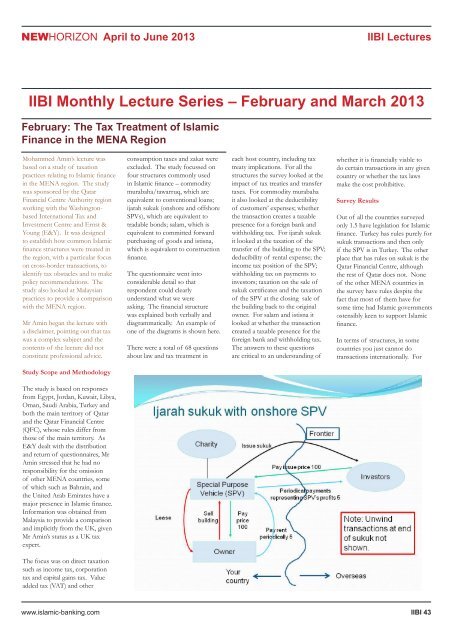NEWHORIZON
NEWHORIZON - Institute of Islamic Banking and Insurance
NEWHORIZON - Institute of Islamic Banking and Insurance
- No tags were found...
Create successful ePaper yourself
Turn your PDF publications into a flip-book with our unique Google optimized e-Paper software.
<strong>NEWHORIZON</strong> April to June 2013<br />
IIBI Lectures<br />
IIBI Monthly Lecture Series – February and March 2013<br />
February: The Tax Treatment of Islamic<br />
Finance in the MENA Region<br />
Mohammed Amin’s lecture was<br />
based on a study of taxation<br />
practices relating to Islamic finance<br />
in the MENA region. The study<br />
was sponsored by the Qatar<br />
Financial Centre Authority region<br />
working with the Washingtonbased<br />
International Tax and<br />
Investment Centre and Ernst &<br />
Young (E&Y). It was designed<br />
to establish how common Islamic<br />
finance structures were treated in<br />
the region, with a particular focus<br />
on cross-border transactions, to<br />
identify tax obstacles and to make<br />
policy recommendations. The<br />
study also looked at Malaysian<br />
practices to provide a comparison<br />
with the MENA region.<br />
Mr Amin began the lecture with<br />
a disclaimer, pointing out that tax<br />
was a complex subject and the<br />
contents of the lecture did not<br />
constitute professional advice.<br />
consumption taxes and zakat were<br />
excluded. The study focussed on<br />
four structures commonly used<br />
in Islamic finance – commodity<br />
murabaha/tawarruq, which are<br />
equivalent to conventional loans;<br />
ijarah sukuk (onshore and offshore<br />
SPVs), which are equivalent to<br />
tradable bonds; salam, which is<br />
equivalent to committed forward<br />
purchasing of goods and istisna,<br />
which is equivalent to construction<br />
finance.<br />
The questionnaire went into<br />
considerable detail so that<br />
respondent could clearly<br />
understand what we were<br />
asking. The financial structure<br />
was explained both verbally and<br />
diagrammatically. An example of<br />
one of the diagrams is shown here.<br />
There were a total of 68 questions<br />
about law and tax treatment in<br />
each host country, including tax<br />
treaty implications. For all the<br />
structures the survey looked at the<br />
impact of tax treaties and transfer<br />
taxes. For commodity murabaha<br />
it also looked at the deductibility<br />
of customers’ expenses; whether<br />
the transaction creates a taxable<br />
presence for a foreign bank and<br />
withholding tax. For ijarah sukuk<br />
it looked at the taxation of the<br />
transfer of the building to the SPV;<br />
deducibility of rental expense; the<br />
income tax position of the SPV;<br />
withholding tax on payments to<br />
investors; taxation on the sale of<br />
sukuk certificates and the taxation<br />
of the SPV at the closing sale of<br />
the building back to the original<br />
owner. For salam and istisna it<br />
looked at whether the transaction<br />
created a taxable presence for the<br />
foreign bank and withholding tax.<br />
The answers to these questions<br />
are critical to an understanding of<br />
whether it is financially viable to<br />
do certain transactions in any given<br />
country or whether the tax laws<br />
make the cost prohibitive.<br />
Survey Results<br />
Out of all the countries surveyed<br />
only 1.5 have legislation for Islamic<br />
finance. Turkey has rules purely for<br />
sukuk transactions and then only<br />
if the SPV is in Turkey. The other<br />
place that has rules on sukuk is the<br />
Qatar Financial Centre, although<br />
the rest of Qatar does not. None<br />
of the other MENA countries in<br />
the survey have rules despite the<br />
fact that most of them have for<br />
some time had Islamic governments<br />
ostensibly keen to support Islamic<br />
finance.<br />
In terms of structures, in some<br />
countries you just cannot do<br />
transactions internationally. For<br />
Study Scope and Methodology<br />
The study is based on responses<br />
from Egypt, Jordan, Kuwait, Libya,<br />
Oman, Saudi Arabia, Turkey and<br />
both the main territory of Qatar<br />
and the Qatar Financial Centre<br />
(QFC), whose rules differ from<br />
those of the main territory. As<br />
E&Y dealt with the distribution<br />
and return of questionnaires, Mr<br />
Amin stressed that he had no<br />
responsibility for the omission<br />
of other MENA countries, some<br />
of which such as Bahrain, and<br />
the United Arab Emirates have a<br />
major presence in Islamic finance.<br />
Information was obtained from<br />
Malaysia to provide a comparison<br />
and implicitly from the UK, given<br />
Mr Amin’s status as a UK tax<br />
expert.<br />
The focus was on direct taxation<br />
such as income tax, corporation<br />
tax and capital gains tax. Value<br />
added tax (VAT) and other<br />
www.islamic-banking.com IIBI 43
















